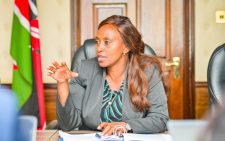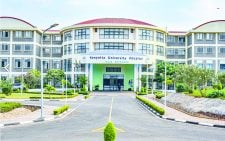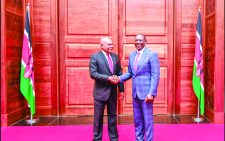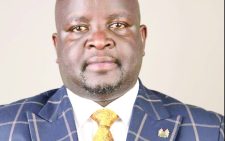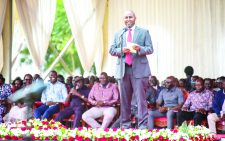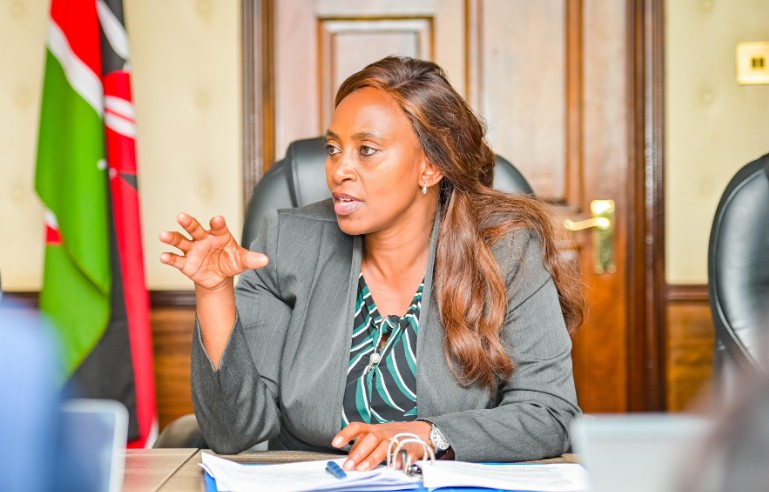Monarchs inspect projects, military parade at the Coast
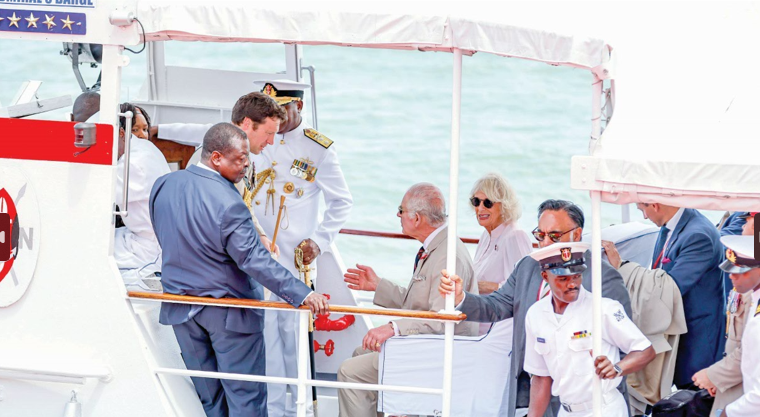
Mombasa city came to a standstill yesterday as it hosted King Charles III and Queen Camilla on the third day of their visit to Kenya.
For Mombasa residents, the arrival of the Monarch signifies better days ahead for the tourist city which has in recent past struggled with international arrivals.
The King’s arrival, according to residents, is a clear message that Kenya is safe and can be the destination of choice in Africa.
This he said is likely to open up more opportunities for Kenyans.
“The coming of the King is good music to the ears of locals because it is likely to boost tourism arrivals…. More visitors especially from the UK are likely to consider Kenya,” said Nashon Wekesa, a resident of Nyali where the Royal Majesties also visited yesterday.
Tourism destination
While expressing confidence that the King’s visit was likely to turn around the economic fortunes of the country in various ways, the residents pleaded with the King to use his position to market Kenya as a tourism destination in the world.
“We are confident the King’s visit brings forth good tidings…I am sure the King has the interests of Kenyans at heart considering that it was while his mother the late Queen Elizabeth II was here that she became the Queen. With this in mind, we kindly ask the King to market Kenya well,” Golvine Oktoi another resident said.
The residents further asked the King to also extend support to the country’s health sector which is ailing with shortage of drugs.
The King and Queen began their tour of the port City at Mtongwe Naval Base, where they arrived aboard the Admiral’s Barge. They were welcomed at the base by President William Ruto and First Lady Rachel Ruto.
As the Captain General of the Royal Marines, a rank he was awarded last year on the 358th anniversary of the founding of the Corps, King Charles III arrived wearing his Royal Marine tie, while the Queen was wearing Anna Valentine’s pink chiffon tunic and white palazzo trousers with no significant jewelry.
Widely acknowledged as one of the world’s elite fighting forces, the Royal Marine Commandos are the amphibious troops of the Royal Navy. As Prince of Wales, The King embarked on a career in the Royal Navy, undergoing training at the Commando Training Centre Royal Marines (CTCRM) in Lympstone, Devon, in order to qualify as a helicopter pilot.
King Charles III later served alongside Royal Marines on board HMS Hermes, as part of 845 Naval Air Squadron, completing military exercises in the Western Atlantic and the West Indies.
Defence collaboration
At the Mtongwe Naval base, the King and Queen while at the beach head, witnessed the Kenya Marines, having been trained by the Royal Marines, demonstrating a covert beach landing, showing defence collaboration in action.
The Kenyan Navy was established on December 12, 1964, exactly one year after Kenya gained her independence. Today, the Kenyan Navy operates out of two main sites: Mtongwe and Manda Bay.
The Royal Navy partners with the Kenya Navy on various courses in the UK as well as by training teams deployed to Kenya, such as the annual multinational Exercise CUTLASS EXPRESS.
In the UK, a Kenya Navy Officer who is currently on the Royal Marines Young Officer Course has become the first Kenyan to pass the Commando Course.
The King and Queen then left for Nyali Beach for a marine conservation project involving beach cleanup and turtle conservation.
The King arrived at Nyali Beach by car and was received by the Head of the Coastal and Marine Ecosystems Research Center, Kenya Wildlife Research and Training Institute, Dr Mohamed Omar, and Kenya Wildlife Service (KWS) officials.
The King first visited the Early Birds Banda, a community organisation that promotes marine conservation on Nyali Beach, hosting beach clean-up events each year as well as engaging local young people in sports activities, and employment and training opportunities.
The King interacted with representatives from Baus Taka Enterprise, a women and youth led enterprise that uses technology to enhance marine conservation efforts; and Dipesh Pabari, co-founder of Flipflopi, a movement which aims to end single use plastic, transforming and upcycling litter to preserve the marine and environment and create products rooted in heritage.
Swahili chair
Flipflopi created the world’s first sailing dhow out of recycled plastic (including flip flops), and have crafted an intricate, traditional Swahili chair in honour of His Majesty’s visit.
Plastic litter from the coastal cities of Mombasa and Kilifi currently affects more than 800 marine and coastal species through entanglement, ingestion and habitat alteration.
Also yesterday, the King and Queen visited Kuruwitu Conservation Area, where they were taken through a raft of marine conservation activities by the Coastal communities including coral restoration.
The King met the Kuruwitu Community Welfare Association (KCWA), which works to protect the area from overfishing, climate change, and uncontrolled fish and coral collection, while supporting the livelihoods of local communities.
He then proceeded to the permaculture garden to see innovative, climate-smart kitchen gardening techniques, which demonstrate how small spaces can be successful gardens.
The King then met the Kuruwitu Beach Management Unit fishermen and fishmongers, locally known as mama karangas.
Here, KCWA took the King through the process of coral gardening; the production of artificial coral restoration structures, and coral ‘plugs’ made of concrete and coral fragments.
Set up in 2003, KCWA was aimed at protecting the area from overfishing, climate change, and uncontrolled fish and coral collection.
This community led organisation brings together 550 families made up mostly of artisanal fishers across six fishing landing sites. The association received grant support from the Commonwealth Development Fund to buy equipment and conduct training for alternative income generating projects.
In 2017 the organisation won UNDP’s Equator Initiative Prize and was recognised for outstanding community efforts to reduce poverty through the conservation and sustainable use of biodiversity. As a result of the co-management of this marine protected area, the local community reports a bigger and better fish catch.
The association also runs several initiatives to support ecotourism including compensating the community for adopting turtle nests and regenerating the coral reefs which provides job opportunities to the community through tourism.
The British Monarch is expected to wind up their visit in the country today.

